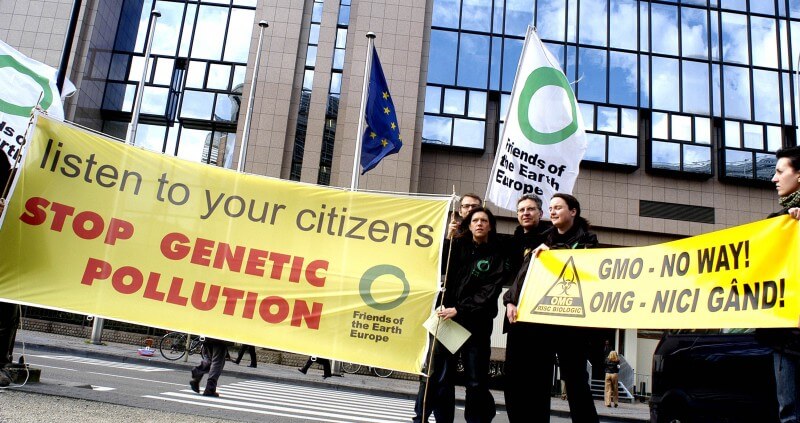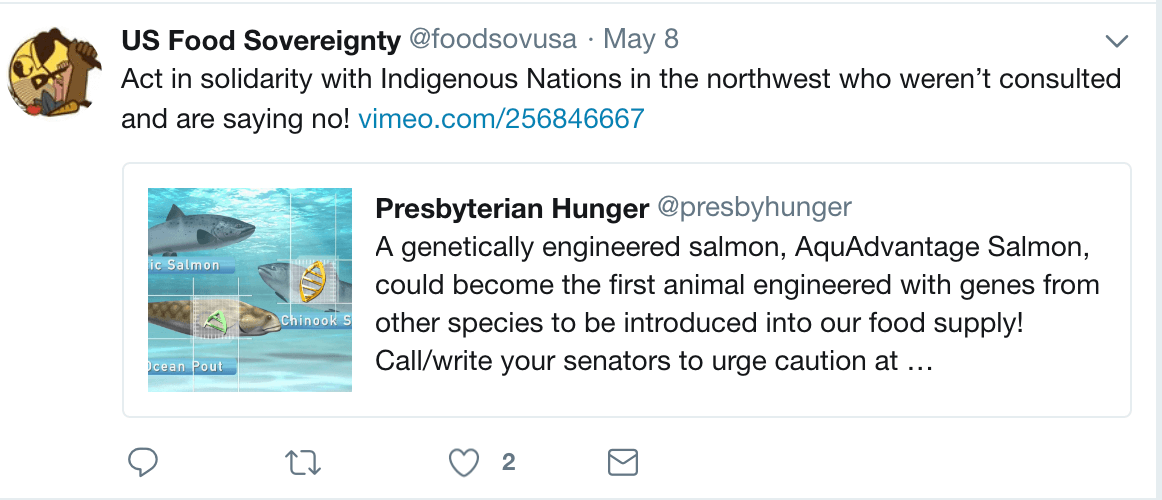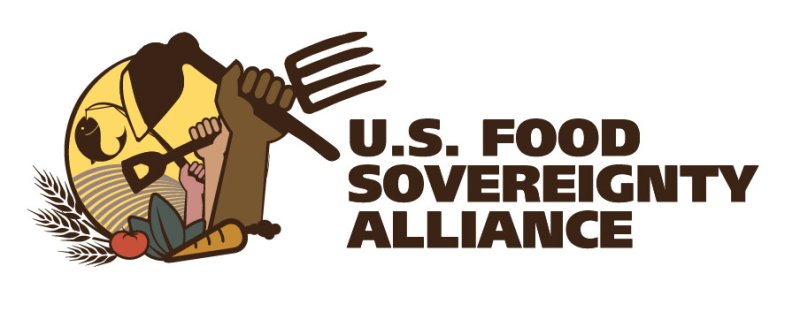The US Food Sovereignty Alliance (USFSA), founded in 2010, is a US-based alliance of “food justice, anti-hunger, labor, environmental, faith-based and food producer groups” that is behind the growing agroecology movement. The alliance says it works “to end poverty, rebuild local food economies and assert democratic control over the food system.” One way that they strive to do this is by “ challenging corporate control of the food system” and the “false solutions of biotechnology.”
Several anti-GMO NGOs are members of the USFSA, such as Food and Water Watch, Friends of the Earth, the Institute for Agriculture and Trade Policy, and the Pesticide Action Network in the United States and La Via Campesina, an international movement of farmers in the developing world that has led small farmer opposition to biotech innovation. The alliance states that it is opposed to seed patents and “genetic manipulation of seeds for corporate profit.”

“Proprietary genetically manipulated seeds are the problem, not the answer to world hunger,” the group wrote in 2013 in opposition to the World Food Prize. “Reliance on genetically modified crops and industrial agriculture creates crippling debt for farmers, produces herbicide-resistant ‘superweeds,’ and keeps control of our food system in the hands of large corporations.” They claim each country should have the right to choose its own “food path” based on “improved soil health, crop rotation and diversification.”
Many anti-GMO activists blame the cost of GMO seeds for “crippling debt for farmers,” most notably in the claim that the cost of insect-resistant GMO Bt cotton seeds led to a surge in farmer suicides in India, although this popular meme has been thoroughly debunked. (In fact, In fact, the suicide rate for male Indian farmers is slightly lower than the non-farmer rate.) Recent research has found that marriage loans and health care costs—not seed costs—are the main drivers of debt for smallholder farmers in India.
Herbicide-resistant “superweeds” are another common activist criticism of GMOs. The science shows that these concerns are overblown. Weed resistance to herbicides is part of the natural process of evolution. It’s the same reason we need to develop new antibiotics and other medicines. As weed scientist Andrew Kniss says, “herbicide resistant weed development is not a GMO problem, it is a herbicide problem.” Some non-GMO plants such as sunflowers, which are not genetically engineered have developed herbicidal weed resistance at a higher rate than GMO crops.
Many anti-GMO activists equate GMOs with seed patents, but seed patents have been around since the first hybrid varieties were developed in the 1930s. Hybrid and GMO seeds dramatically outperform non-patented seeds, and often require fewer inputs. Removing patent protection from seeds would significantly hinder the development of the GMO crops that farmers in many of the top grain-producing nations rely upon. “It takes years to develop a well-functioning product, and companies rely on patents to recover the heavy investment made in R&D,” geneticist Layla Katiraee wrote in 2015 for the GLP.
There’s also the myth that GMO seed-patent-holders, such as Monsanto, sue farmers who accidentally plant GMO seeds. There is no documented instance of any GMO seed company suing a farmer for unknowingly reusing patented seeds. There have also not been any lawsuits over instances where GMO seeds blew onto a farm and germinated.
USFSA supports the concept of food sovereignty under the definition provided by La Vía Campesina at the World Food Summit in 1996.
 On social media, the group has promoted posts by anti-GMO groups such as the Organic Consumers Association and the Bioscience Resource Project. USFSA has also used social media to campaign against fast-growing genetically engineered salmon, the herbicide glyphosate and the Bayer-Monsanto merger.
On social media, the group has promoted posts by anti-GMO groups such as the Organic Consumers Association and the Bioscience Resource Project. USFSA has also used social media to campaign against fast-growing genetically engineered salmon, the herbicide glyphosate and the Bayer-Monsanto merger.
The alliance organized a campaign in 2012 to try to get the company dairy cooperative Land O’Lakes to “stop pushing genetically modified organisms (GMOs) – such as DowElanco’s recombinant bovine growth hormone (rBGH) and Monsanto’s roundup ready alfalfa.”
The alliance’s 2014 report on seeds and seed practices in the US states: “Oppose GMOs whenever long-term negative environmental effects, health problems and/or contamination dangers have not been ruled out by independent studies, or if farmers are negatively impacted. Where not already being done, labeling GMO ingredients should be a standard practice so that growers and consumers can make knowledgeable choices.”
USFSA has criticized the Gates Foundation and the Borlaug Foundation for their philanthropic work aimed at improving agricultural productivity in developing countries.
The alliance also promotes “agroecology,” a model of farming in which synthetic fertilizer, pesticides, and genetically modified seeds are prohibited.
USFSA does not provide any information on its website about who funds the alliance or the people who operate it.
Food Sovereignty Prize
 The USFSA’s “Food Sovereignty Prize”, first awarded in 2009, is meant to counter and compete with the World Food Prize, awarded by the Borlaug Foundation. The Prize challenges the idea that global hunger, poverty and suffering can be alleviated purely through promoting more agribusiness and aquaculture. Instead, the Prize advocates for those who work to eliminate the unequal distribution of wealth and resources, and overturn destructive political, economic, and social policies to open better access to food to communities in need.
The USFSA’s “Food Sovereignty Prize”, first awarded in 2009, is meant to counter and compete with the World Food Prize, awarded by the Borlaug Foundation. The Prize challenges the idea that global hunger, poverty and suffering can be alleviated purely through promoting more agribusiness and aquaculture. Instead, the Prize advocates for those who work to eliminate the unequal distribution of wealth and resources, and overturn destructive political, economic, and social policies to open better access to food to communities in need.
Members
- Agricultural Missions
- Alaska Sustainable Fisheries Trust
- Applied Research Center/Colorlines.com
- Casa del Llano
- Community Alliance for Agroecology
- Community Alliance for Global Justice
- Community to Community – De Comunidad a Comunidad
- Detroit Black Community Food Security Network
- Duluth Community Garden Project
- Family Farm Defenders
- Farm Aid
- Farmworker Association of Florida
- Farmworker Support Center
- Florida Certified Organic Growers and Consumers
- Food Chain Workers Alliance
- Food First!
- Food and Water Watch
- Friends of Brook Park (formerly South Bronx CSA)
- Friends of the Earth
- Friends of the MST (US)
- Garden Justice Legal Initiative
- Groundswell: Center for Local Food and Farming
- Grassroots Global Justice Alliance
- Grassroots International
- Groundswell
- Growing Food and Justice for All Initiative
- Indigenous Environmental Network
- IATP (Institute for Agriculture and Trade Policy)
- IDEX (International Development Exchange)
- Live Real
- Local to Global Advocates for Justice
- Maryknoll Office for Global Concerns
- Movement Generation
- National Family Farm Coalition
- New Orleans Food and Farm Network
- Northeast Organic Farming Association
- Other Worlds
- Pesticide Action Network – North America (PANNA)
- Presbyterian Hunger Program (PHP)
- Rural Coalition
- Soul Fire Farm
- SouthWest Organizing Project
- Southwest Workers Union
- UMCOR (United Methodist Committee on Relief
- WhyHunger






























